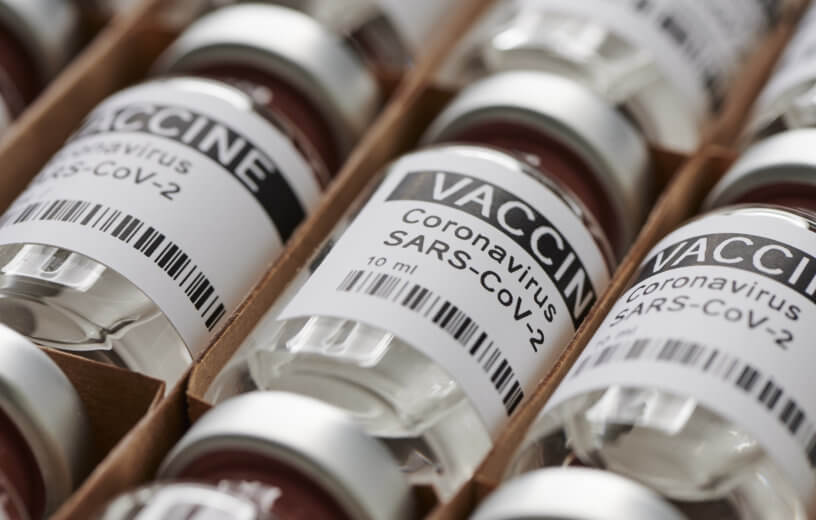NEW YORK — In a global first, pharma giants Pfizer and BioNTech, announce a greater than 90% effectiveness for their vaccine candidate against SARS-CoV-2, the virus that causes COVID-19. The results come after the first interim analysis of the phase 3 clinical study. Now, an Emergency Use Authorization (EUA) submission is planned for soon after the next required safety milestone.
The phase 3 clinical trial for Pfizer’s COVID-19 vaccine began on July 27. So far, it includes 43,538 participants with no evidence of prior SARS-CoV-2 infection. As of the date of the interim analysis, 38,955 of these individuals have received both doses of either the vaccine candidate or a placebo. Approximately 42% of the participants come from racially and ethnically diverse backgrounds.
The first interim analysis for the phase 3 study was performed on November 8. This milestone was preset through discussion between Pfizer/BioNTech and the FDA, and was scheduled to occur after 94 trial participants were confirmed positive for SARS-CoV-2 infection. The analysis looks at data from seven days after the second dose of vaccine or placebo.
Pfizer and BioNTech report that the case split of the 94 evaluable cases between participants receiving the vaccine and those receiving the placebo indicates a greater than 90% vaccine efficacy rate. This means that protection against COVID-19 is achieved at 28 days after the first vaccination.
No serious safety concerns are reported in this first interim analysis of BNT162b2. Not surprisingly, the DMC has recommended that the trial continue as planned.
“The first set of results from our phase 3 COVID-19 vaccine trial provides the initial evidence of our vaccine’s ability to prevent COVID-19,” says Pfizer Chairman and CEO, Albert Bourla. “We are reaching this critical milestone in our vaccine development program at a time when the world needs it most with infection rates setting new records, hospitals nearing over-capacity and economies struggling to reopen. With today’s news, we are a significant step closer to providing people around the world with a much-needed breakthrough to help bring an end to this global health crisis.”
What’s the next step towards making Pfizer’s COVID-19 vaccine available?
While encouraging, scientists caution that these early results leave several key questions that will determine whether this vaccine and others like it can prevent the most severe cases. There are also questions as to whether it will provide immunity that lasts long enough to quell the coronavirus pandemic.
“We need to see the data in the end, but that still doesn’t dampen my enthusiasm,” Florian Krammer, a virologist at Icahn School of Medicine at Mount Sinai in New York City and a participant in the trial, tells Nature in a statement. “This is fantastic.”
Although researchers are anxious to see the trial data, they agree that a vaccine that works — even one with caveats — is the best way to begin returning life back to normal.
“When we embarked on this journey 10 months ago this is what we aspired to achieve. Especially today, while we are all in the midst of a second wave and many of us in lockdown, we appreciate even more how important this milestone is on our path towards ending this pandemic and for all of us to regain a sense of normality,” Ugur Sahin, BioNTech co-founder and CEO, says in a statement.
An EUA for the vaccine is expected to be submitted to the FDA around the third week of November. At this point, the companies estimate that a median of two months of safety data following the second dose of the vaccine candidate will be available. This is the amount of safety data required by the FDA for an EUA submission.
The trial, which is still enrolling, is expected to continue through the final analysis, which will occur when 164 confirmed COVID-19 cases have accrued at 7 days after the second dose of vaccine. In addition to this endpoint, the final analysis will also determine the number of cases at 14 days after the second dose. Pfizer and BioNTech believe these data will facilitate comparisons made across all COVID-19 vaccine studies.
Other important questions will be addressed by this study as it proceeds to completion. Researchers plan to evaluate the vaccine for its potential to protect against COVID-19 in individuals who have been previously exposed to SARS-CoV-2. They will also look at the vaccine’s ability to protect against severe COVID-19 disease. Long-term protection and safety will also continue to be monitored in participants for an additional two years after their second dose.
Based on current projections, Pfizer and BioNTech expect to produce up to 50 million vaccine doses in 2020 and up to 1.3 billion doses in 2021 to be used globally.
